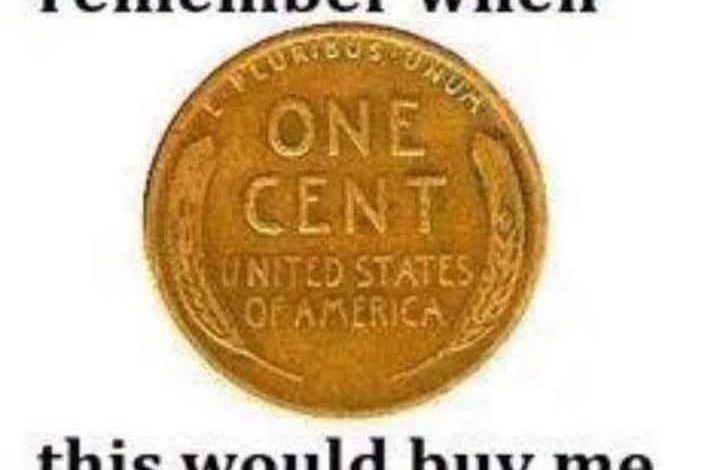
ADVERTISEMENT
The Value of a Penny: Nostalgia for Simpler Times
Introduction
The sight of a penny often evokes fond memories of a time when life felt simpler and slower-paced. For many, the humble one-cent coin wasn’t just spare change; it was a key to small joys like candy, gum, or even a soda. The image above serves as a nostalgic reminder of the days when a single penny held significant value. This article takes a trip down memory lane, exploring the cultural and economic significance of the penny and the cherished memories it holds for older generations.
The Golden Age of the Penny
In the early-to-mid 20th century, a penny had considerable purchasing power. It could buy a piece of candy, a handful of peanuts, or even a stick of gum. Corner stores, also known as “five-and-dime” shops, were filled with jars of penny candies, enticing children with colorful displays and a wide selection of treats. These shops became social hubs, where kids spent their allowances carefully selecting their favorites.
The value of a penny extended beyond candy. In the 1940s and 50s, a handful of pennies could contribute to savings for a comic book, a soda pop, or even a movie ticket. For children of that era, a penny wasn’t just money—it represented freedom, independence, and the thrill of getting something sweet or fun.
The Decline of the Penny’s Power
As inflation crept into the economy, the purchasing power of a penny began to diminish. By the 1980s, the cost of candy and other small items had risen, and the penny’s role in everyday transactions started to wane. Today, the penny is often seen as an inconvenience—left in jars, forgotten in pockets, or discarded altogether.
However, for those who grew up in the mid-20th century, the penny remains a powerful symbol of their youth. It represents a time when small things brought immense happiness, and simple pleasures were easily accessible.
ADVERTISEMENT
The Role of Nostalgia
Nostalgia for the penny and what it once represented goes beyond its monetary value. It’s a longing for the days when life seemed less complicated. The penny serves as a tangible link to a past filled with cherished memories:
- Childhood Freedom: A pocket full of pennies gave children the freedom to choose their own treats, teaching them the basics of saving and spending.
- Community Connection: Local stores and candy shops were more than places to buy goods—they were community spaces where people gathered and shared stories.
- The Joy of Small Pleasures: In a world where entertainment is often expensive, the penny reminds us of the joy found in small, simple pleasures.
Lessons from the Past
While the penny may no longer hold the same economic significance, its legacy teaches us valuable lessons:
- Appreciating Small Things: The joy of buying candy with a penny reminds us to appreciate the small, meaningful moments in life.
- Financial Responsibility: For many, the penny was their first introduction to money management, an essential skill for life.
- Community Spirit: The shared experience of penny candies and corner shops fosters a sense of community and connection that is often missing in today’s fast-paced world.
The Penny in Today’s World
Despite its diminished value, the penny still holds cultural significance. It is a symbol of frugality, nostalgia, and history. Some people keep jars of pennies as reminders of their childhood, while others use them in craft projects or for good luck. The phrase “a penny for your thoughts” continues to highlight its symbolic importance in our language and culture.
Conclusion
The penny may no longer buy candy or much else, but its legacy endures in the memories of those who grew up during its golden age. It reminds us of a time when life was simpler, joys were smaller, and a single coin could brighten a child’s day.
In a world dominated by digital transactions and rising costs, the penny serves as a nostalgic emblem of the past, a gentle reminder to savor life’s little pleasures and cherish the memories they create. So, the next time you come across a penny, take a moment to remember its history, its significance, and the happiness it once brought.
ADVERTISEMENT
Because sometimes, it’s the smallest things—like a penny—that hold the greatest value. ✨💰🍬




